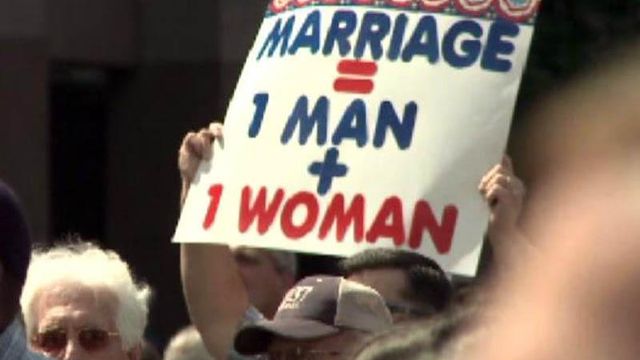Gay marriage ruling doesn't end debate in NC
Although the U.S. Supreme Court's ruling on Friday legalized same-sex marriage nationwide, advocates on both sides of the debate said the fight over gay rights is far for over in North Carolina.
Posted — UpdatedGay marriage has been legal in North Carolina since last October, when federal judges overturned the state's 2012 constitutional amendment defining marriage as being between one man and one woman. The Supreme Court ruling, however, was needed to settle the national debate, as 14 states continued to outlaw same-sex unions or refuse to recognize such marriages legally performed elsewhere.
"This is a hard-fought victory for same-sex couples and the LGBT community in every nook and cranny of this country for full equality," said Chris Sgro, executive director of Equality North Carolina.
Sgro said he married his longtime partner last fall after the initial federal court decision and called Friday's ruling "affirming."
"It obviously means that we know that this is going to continue to be the law of the land, and we don’t have to worry about our marriages being undone in the state of North Carolina," he said.
Same-sex marriage opponents were bitter and angry about the decision.
"We think it’s quite arrogant of the U.S. Supreme Court to assume the position of redefining an institution it didn’t create," said Tami Fitzgerald, executive director of the North Carolina Values Coalition. "It will impact the stability and structure of families across our country."
"I thought the states were making that decision. Why now is the federal government taking over everything the states used to do?" asked Ann Watke, a Catholic in Raleigh.
"You can’t discount thousands of years of history," said John Rustin, president of the North Carolina Family Policy Council. "Who’s to say, under that frame of mind, (marriage) won’t include multiple individuals or some other constructs in the future? Once you go down that path, it’s really difficult to determine where that will end."
Rustin and Fitzgerald said they plan to step up lobbying for legal protections in North Carolina for people who oppose gay marriage.
"One of our greatest concerns now is the threat to religious liberty that this opinion could pose to churches, to pastors and to individuals who have a fundamental belief marriage is only between one man and one woman," Rustin said.
"The fight shifts now in terms of making sure North Carolinians who have sincerely held religious beliefs about marriage still have the ability and freedom to exercise those beliefs and act on those beliefs," Fitzgerald said. "We don’t have a Religious Freedom Restoration Act in North Carolina. We will redouble our efforts now to get RFRA passed."
RFRA legislation would make it illegal for the state to "burden" a person's ability to follow his or her religious beliefs. The definition of "person" includes religious institutions, businesses and associations. Opponents of the bill suggest it could lead to government workers and those working for private businesses to refuse to provide services for any number of reasons based on race, gender or other characteristics.
Republican legislative leaders said in April that they had no plans to take up any RFRA proposals this year after similar laws in other states prompted national criticism by business and civil rights groups. Gov. Pat McCrory also said he didn't see the need for any such laws in North Carolina.
Lawmakers did pass legislation over McCrory's veto that allows magistrates and workers in county register of deeds offices to opt out of presiding over weddings or issuing marriage licenses if they have religious objections to same-sex marriage.
The Supreme Court ruling doesn't affect the magistrate opt-out law, but the American Civil Liberties Union is monitoring the impact of the legislation as it weighs a separate legal challenge to it.
"I think that (the marriage ruling) underlines the great skepticism the Supreme Court has for measures that target gays and lesbians for different treatment than heterosexual couples," said Chris Brook, legal director of the ACLU of North Carolina. "The timing of the introduction of this (magistrates) measure, as well as the legislative comment in support of this measure, make very plain that the General Assembly was targeting gay and lesbian North Carolinians for inferior treatment."
Gay-rights advocates, meanwhile, said they plan to continue lobbying for equality in the workplace as well as at the altar.
"We are still one of the 30-some states where you can be married and the next day be fired for being transgender," Sgro said. "We don’t have employment protections for gay and transgender employees. Seventy-some percent of North Carolinians actually think that these protections are so common-sense that they are already the law. Unfortunately, they are not."
Related Topics
• Credits
Copyright 2024 by Capitol Broadcasting Company. All rights reserved. This material may not be published, broadcast, rewritten or redistributed.






